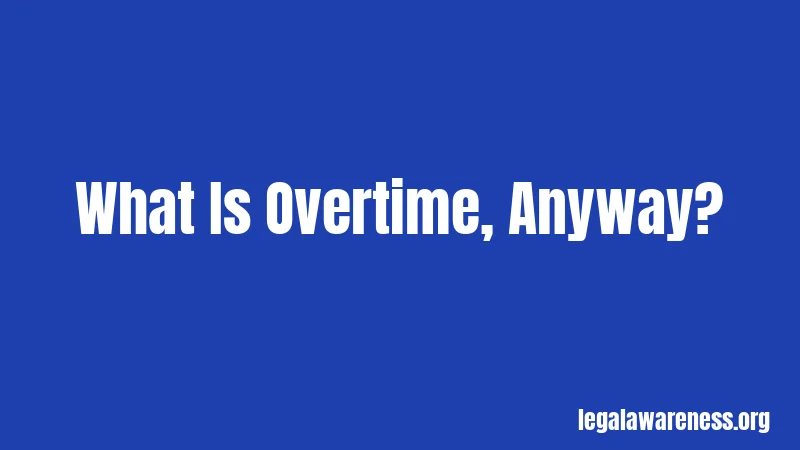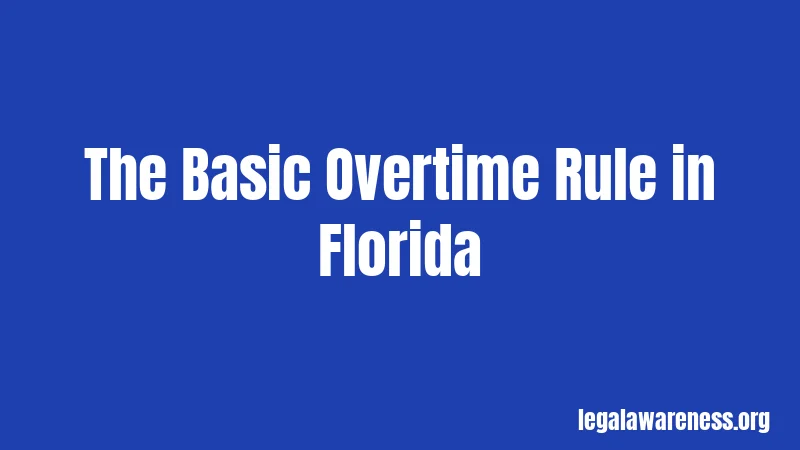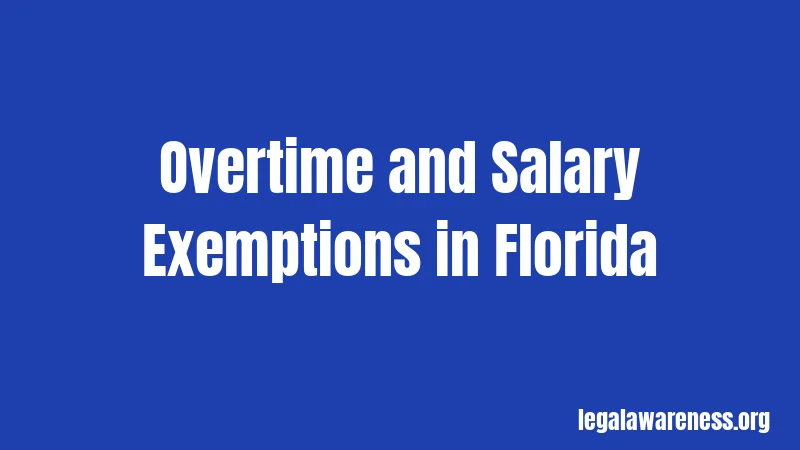Florida Overtime Laws in 2026: What Every Worker Needs to Know Right Now
Most people have no idea how overtime actually works in Florida. Seriously. You might be working extra hours and getting paid the wrong amount without even realizing it. Florida’s overtime laws are pretty straightforward, but they do have some quirks that catch people off guard. Let’s break down exactly what you need to know.
If you’re an employee in Florida, understanding overtime is huge. You could be entitled to extra pay that you’re not currently receiving. Or if you’re an employer, knowing the rules keeps you out of legal trouble. Either way, this information matters.
What Is Overtime, Anyway?

So simple. Overtime is extra pay you get for working more than a certain number of hours in a week. In Florida, the federal rules usually apply. That means you’re entitled to overtime when you work over 40 hours in a single workweek.
Here’s the key thing: overtime rates are typically one and a half times your regular hourly wage. If you normally make $15 an hour, your overtime rate would be $22.50 per hour. Florida doesn’t have its own stricter overtime law. Instead, the state follows the Fair Labor Standards Act (FLSA), which is the federal rule.
You’re probably thinking about whether this applies to you. Pretty much everyone is covered, but there are some exceptions. Let me walk you through the basics.
Who Qualifies for Overtime in Florida?
Wondering if you’re eligible? Most employees in Florida are entitled to overtime pay. If your company employs workers, federal law likely applies to them. That’s true across construction sites, restaurants, offices, retail shops, and most other workplaces.
The rule is pretty clear: if you work for a company that does at least $500,000 in business per year, overtime laws probably apply. Even smaller businesses might be covered if they’re involved in interstate commerce. Basically, stay with me here, if you work for someone else and they’re doing significant business, you’re likely protected.
Not sure what counts as your employer’s revenue? The good news is that the federal government has made this relatively simple. Almost every business meets these thresholds. Very few employers can claim they’re too small.
The Basic Overtime Rule in Florida

Okay, pause. Read this carefully. In Florida, the overtime rule is based on the Fair Labor Standards Act. When you work more than 40 hours in a workweek, you must be paid overtime for those extra hours.
Your overtime rate must be at least one and a half times your regular rate of pay. So if you earn $20 an hour, overtime should be at least $30 per hour. This isn’t negotiable. Your employer can’t pay you less, and they can’t ask you to waive it.
The workweek is usually Sunday through Saturday, but your employer can choose a different seven-day period. What matters is that it stays consistent. Your company can’t switch when it’s convenient for them.
Actually, this is where things get interesting. Some employers try to get creative with how they calculate overtime. They might try different methods or argue about what counts as “hours worked.” That’s where employees need to be careful.
What Counts as Hours Worked?
Not all time at work counts toward your 40-hour threshold. But most of it does. Let me break down what actually counts.
Time spent actively working absolutely counts. This includes your regular job duties, meetings, training that’s required for your job, and time spent in uniform waiting to work. If you’re on the clock, it counts.
Paid breaks and meal periods are trickier. Short breaks (like 5 to 20 minutes) usually count as work time. Longer meal periods, say 30 minutes or more, typically don’t count if you’re truly free from duties. But honestly, this part can be tricky, so make sure you understand your workplace’s specific policies.
Commute time doesn’t count. Travel to and from home is on your own time. Travel during your workday for job purposes does count. For instance, if you’re a service technician driving between appointments, that travel counts toward your hours.
On-call time is situation-dependent. If you have to stay on the premises and can’t use the time for your own purposes, it counts. If you can go home and just respond if called, it usually doesn’t count. Your contract or company policy should explain this.
Overtime and Salary Exemptions in Florida

Here’s where it gets complicated. Not everyone who gets a salary is automatically exempt from overtime. This is where many employees get confused, and many employers get it wrong too.
To be exempt from overtime, an employee must meet three tests. First, they must be paid on a salary basis. That means getting a fixed amount regardless of hours worked. Second, they must earn at least a certain minimum amount. Third, they must perform duties that qualify for an exemption category.
The salary minimum changes regularly. As of 2026, the federal threshold is $868 per week, or roughly $45,000 per year. But this number increases periodically, so check current requirements.
The job duties matter most. Common exemptions include executive, administrative, professional, and outside sales positions. An executive exempt employee typically supervises other employees and has real decision-making authority. An administrative exempt employee performs office work and uses independent judgment on matters of significance. A professional exempt employee uses specialized knowledge and judgment, like lawyers or engineers.
Honestly, this is the part most people miss. Just because your job title sounds important doesn’t mean you’re exempt. You need to actually perform exempt duties. A manager who doesn’t supervise anyone? Probably not exempt. A so-called administrative assistant doing only clerical work? Probably not exempt either.
If you’re not sure whether you’re exempt, you might be misclassified. This happens more often than you’d think. And if you are misclassified, you could be owed back overtime pay.
Recent Changes to Florida Overtime Law
Florida hasn’t created its own stricter overtime rules in recent years. The state continues to rely on federal law. However, the federal government does update the salary threshold regularly.
In 2024, there were several important federal updates. The Labor Department increased the salary threshold for exempt employees. This change meant that many more workers became eligible for overtime protection. If your salary is close to the threshold, you might have recently become eligible for overtime.
The Fair Labor Standards Act also continues to clarify rules about what qualifies as exempt work. Recent cases have challenged some employer practices. Employees have won lawsuits about misclassification. So if you think you’ve been wrongly classified as exempt, there’s solid legal backing for that concern.
Labor Department enforcement has been more active too. They’ve been investigating more companies for wage and hour violations. This includes overtime violations. So employers have more reason to follow the rules correctly.
Stay informed about any changes. The federal government makes tweaks regularly. Your employer should tell you about changes that affect you, but it’s smart to know on your own.
Calculating Your Overtime Pay
Let me explain exactly how overtime pay gets calculated, because this is crucial. Overtime compensation must be at least one and a half times your regular rate of pay. But what’s your “regular rate”?
For hourly employees, this is straightforward. Your regular rate is your hourly wage. If you make $20 per hour and work 45 hours, you earn $800 for 40 hours plus $150 for 5 hours at time-and-a-half. That’s a total of $950 for the week.
For salaried employees, it’s slightly different. Your regular rate is calculated by dividing your salary by the hours typically worked. If you earn $2,000 per week and normally work 40 hours, your regular rate is $50 per hour. Any overtime hours should be calculated at $75 per hour.
Commission-based pay requires a calculation too. Your regular rate includes commissions earned during the pay period. This gets complex, and this is where employers often make mistakes.
Shift differentials, hazard pay, and other bonuses sometimes factor in. It depends on whether they’re part of your regular compensation. Some bonuses are included in the overtime calculation. Others aren’t. You need to understand what your employer counts.
This is why you should save your pay stubs. Review them carefully. Compare your regular hours to overtime hours. If something doesn’t look right, investigate. Contact your HR department or a wage and hour attorney.
Penalties for Overtime Violations in Florida
So what happens if your employer breaks these rules? The consequences can be serious. Think of it like a traffic ticket, but way more expensive and with bigger problems attached.
Employers who violate overtime rules must pay the unpaid overtime. That’s the baseline penalty. You get the money you should have earned. But it doesn’t stop there.
You’re also entitled to “liquidated damages” equal to the unpaid overtime. Basically, that’s a penalty amount. If your employer owes you $5,000 in unpaid overtime, you can claim an additional $5,000 in liquidated damages. That doubles what the company has to pay.
Willful violations carry even harsher penalties. If your employer knowingly broke the law, you can recover overtime back three years instead of just two. The damages pile up quickly. A few years of misclassified overtime can mean tens of thousands of dollars.
Attorney’s fees and court costs also come out of the employer’s pocket. So pursuing a claim isn’t expensive for the employee. The company pays for everyone’s legal representation if the employee wins.
There’s also potential for civil penalties from the Department of Labor. The government can fine employers for wage and hour violations. These fines can reach thousands per violation per employee.
Special Cases and Exceptions
Sound complicated? Some situations have special rules. Let’s talk about the ones that come up most often.
Seasonal workers have the same overtime rights as full-time employees. Your status as temporary doesn’t change the calculation. If you work over 40 hours in a week, you get overtime for those hours.
Independent contractors don’t get overtime. This is important. If you’re classified as a contractor, overtime rules don’t apply. But misclassification is common. If you’re treated like an employee, you might be entitled to argue you’re an employee for legal purposes. That means overtime rights.
Domestic workers and agricultural workers have different rules. Some domestic workers are exempt from overtime protection. Farm workers have their own special regulations. If you work in these fields, check specific rules for your situation.
Government employees have protections too, but the rules differ slightly from private sector employees. Federal, state, and local government workers generally aren’t covered by the Fair Labor Standards Act for overtime purposes.
Volunteers aren’t entitled to overtime. But if you’re paid anything, you’re probably an employee. Even minimal pay can mean you’re not truly a volunteer.
Employees in certain industries have specific requirements. But basically, overtime laws apply across the board unless a specific exemption exists. When in doubt, assume you’re entitled to overtime.
What to Do If You Think You’re Not Getting Paid Correctly
A friend asked me about this last week. Turns out, most people don’t know where to start if they suspect overtime violations. Here’s exactly what you should do.
First, gather your records. Keep your pay stubs, timesheets, and any communication with your employer about pay. Save emails, text messages, or notes about hours worked. The more documentation you have, the stronger your case.
Second, talk to your employer. Seriously. Sometimes it’s an honest mistake. Request a meeting with HR or management. Explain what you’ve noticed. Bring your records. Give them a chance to fix it. Many issues resolve at this level.
Third, if talking doesn’t work, file a complaint with the U.S. Department of Labor. The Wage and Hour Division investigates overtime violations. You can file online or visit your local office. There’s no cost, and the DOL investigates for free.
Fourth, consider consulting a wage and hour attorney. Many work on contingency, meaning they take payment from your settlement or court award. An initial consultation is often free. A lawyer can tell you whether you have a strong case.
Fifth, you can file a lawsuit. You can sue for unpaid overtime in court. Class action lawsuits are common in wage cases. If multiple employees were treated the same way, a class action might apply.
Document everything going forward. Take screenshots of work hours. Request time records from your employer. Write down any conversations about pay. This protects you if there’s ever a dispute.
Don’t retaliate against yourself by quitting. Staying employed protects your rights. Your employer can’t legally punish you for reporting wage violations, but don’t give them a reason to do anything else.
How Employers Should Calculate and Pay Overtime
If you’re an employer reading this, here’s what you need to do. Get it right the first time. Overtime violations are expensive.
Establish a consistent workweek. Define it clearly in your employee handbook. Make sure employees know which seven-day period is used for overtime calculation.
Accurately track all hours worked. Time clocks, apps, or manual tracking all work. Whatever system you use, it must be accurate. Train managers to record time properly.
Correctly identify exempt employees. Don’t assume. Apply the legal tests. Just having a salaried position isn’t enough. Document why each employee is exempt.
Calculate regular rates properly. Include all compensation earned during the pay period. Bonuses, commissions, and shift differentials might need to be factored in. When in doubt, consult with a payroll expert.
Pay overtime rates correctly. Never try to avoid overtime by using different pay methods. The rate must be at least time-and-a-half of the regular rate.
Keep good records. Document hours worked, pay rates, overtime calculations, and any exemptions. Keep records for at least three years.
Review your practices regularly. Have a wage and hour attorney review your practices annually. Fix problems before they become lawsuits.
Train your managers. Managers often make mistakes that create violations. Train them on proper timekeeping and overtime rules. Make it part of your culture.
Frequently Asked Questions
Do I get overtime for weekends or holidays? Only if you work those days and go over 40 hours that week. Working weekends or holidays doesn’t automatically trigger overtime. It’s the total hours in the workweek that matters.
Can my employer require me to work overtime? Yes, generally. Your employer can require you to work extra hours. You must be paid overtime for those hours. The only limit is that it can’t be retaliation for exercising legal rights.
What if I work multiple jobs? Each job is separate for overtime calculation purposes. Hours from one job don’t count toward the 40-hour threshold for another job. However, if one employer knows you’re working elsewhere, they’re aware of your total hours.
Can I waive my right to overtime pay? No. Your employer can’t ask you to waive overtime protections. Any agreement to waive overtime is unenforceable. You’re entitled to overtime pay regardless of what you agreed to.
How far back can I claim unpaid overtime? Generally, two years for non-willful violations and three years for willful violations. Willful means the employer knew or should have known about the violation. Keep records for a long time. You might find violations dating back years.
Do comp time (time off) arrangements satisfy overtime requirements? No. Your employer must pay you in cash for overtime hours at the overtime rate. Offering time off instead isn’t legal. You can take time off, but you still get paid for overtime hours.
What if I’m salaried but working way more than 40 hours? If you’re properly classified as exempt, overtime doesn’t apply. If you’re misclassified, you should be getting overtime for all hours over 40. This is a common problem for salaried employees.
Can my employer average my hours across multiple weeks? No. Overtime is calculated on a workweek basis. A week where you work 45 hours requires overtime pay for that week. Your employer can’t average it with a slower week.
Do I get overtime for jury duty, military leave, or sick leave? Generally, no. Hours not actually worked don’t count toward the 40-hour threshold. However, your company’s policy or union contract might provide additional protections.
What’s the difference between being on call and working? On-call time usually doesn’t count as work time unless you’re required to stay on the premises. If you’re on premises and can’t use time for personal purposes, it counts. If you can go home and respond if called, it typically doesn’t count.
Final Thoughts
Now you know the basics. Florida follows federal overtime laws. If you work more than 40 hours in a week, you’re entitled to overtime pay at least one and a half times your regular rate. Most employees are covered. Some aren’t, but the exceptions are specific.
Whether you’re an employee or an employer, understanding these rules protects you. Employees should track their hours and speak up if something seems wrong. Employers should ensure they’re calculating overtime correctly and classifying employees properly.
If you suspect a violation, start by talking to your employer or HR. If that doesn’t work, the Department of Labor can help. And don’t hesitate to consult a wage and hour attorney. These violations happen more often than you’d think, and the law gives you strong protections.
Stay informed. Keep good records. Know your rights. And when in doubt, ask a professional. You’ve earned your pay. Make sure you’re getting every dollar you’re due.
References
Fair Labor Standards Act (FLSA) – U.S. Department of Labor
Overtime Pay Requirements – U.S. Department of Labor
Wage and Hour Division – File a Complaint
Florida Administrative Code – Chapter 62-701
Minimum Wage and Salary Thresholds – Department of Labor
